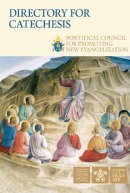Book Review: Holiness by embracing your life
Article:
01.09.20
Holiness by embracing your life
Domestic Monastery by Ronald Rolheiser, Darton Longman and Todd, 112pp, £6.99 reviewed by Kristina Cooper
Ronald Rolheiser OMI is a respected, insightful spiritual writer, known for his books and newspaper columns; thus I was really looking forward to receiving this book, as I admire his writing and the topic interested me. Before I even started reading it, however, I was put off and irritated by its presentation and cost - £6.99 – for what is basically a pamphlet/ lecture rather than a proper book (only 7,000 words). The text has been padded out with endless, not very appealing, black and white illustrations, as the publishers have sought to make it into something it is not.
Parents and holiness
At the same time Rolheiser always has valuable things to say and this book is no exception. His main insight is that parents, particularly mothers, who embrace their calling can come to holiness through this role as much as the celibate contemplative in the monastery. I remember years ago, receiving a similar revelation of what appears as a dismissive comment by St Paul in his letter to Timothy (1 Tim 2.15) that women “will be saved through childbearing, provided they continue in faith and love and holiness, with modesty”. To modern ears this can sound as if this is all women are good for and they shouldn’t presume to have a career, education or an interest in spiritual matters.
But as a single woman struggling to follow the Lord, I saw what an advantage mothers have over me in the Christian life just through being mothers. I have to constantly go out of my way to choose to serve others, with the constant temptation not to bother and lapse into self-centredness. This is why it was so essential for me to make sure I do have my hour of prayer to keep my mind focussed on God and his call to follow the path of holiness.
Heroic mothers
But for the mother of a baby, crying in the night, it’s automatic to put her child’s needs before her own. Thus it is not as necessary for her to pray in the same way as it is for the single person or the religious to help her to forget self. Her very way of life, if embraced, is a natural way to holiness. I remember my own mother, who had five children, telling me that for the first ten years of her married life, she never read a book or went to the loo on her own, and she adored reading. Looking back I can see that such death to self was heroic, yet I never thought about it at the time because that was what was expected of mothers. If the “monastery is a school of love because it teaches us to forget ambition, convenience and self gratification in order to open our hearts to love,” according to the Trappist monk and spiritual writer, Michael Casey OCSO whom Rolheiser quotes, how much more the demands of parents in family life?
Embrace your vocation
The Domestic Monastery is peppered with references and interesting quotes from the saints and spiritual masters, some familiar and some not which Rolheiser unpacks for the modern reader underlining the link between family life and the monastic one. The Desert Fathers’ adjunct to “Go to your cell, and your cell will teach you everything you need to know” is a reminder not just to the monk but also to the banker or the mother to embrace their vocation and to be faithful to its commitments, rather than looking elsewhere for happiness and solace. St Francis de Sales, who wrote the “Introduction to the Devout Life” says much the same thing. He explains that each of us has a different spirituality suitable for our way of life. I remember being struck by his advice to a married woman of court, who wanted to spend more time in prayer and didn’t want to participate in what she saw as the frivolity of court life. St Francis told her, that as long as she was married, she should support her husband and attend these functions, play cards, dance, wear nice clothes etc as part of her wifely duties. Once he was dead, she could go into a cloister and opt for a different way of life.
Just showing up
Apart from this main theme Rolheiser addresses other familiar topics such as the importance of friendship and its different dimensions; the tension in the spiritual life between action and contemplation and between individual fulfilment and the needs of the community. He also looks at the problems of busyness and the sacredness of time, and reflects on the seasons of life and the importance of preparing for death.
I found particularly helpful the chapter on prayer, and Rolheiser’s reminder that just showing up for prayer is often enough, and the importance of ritual and routine to stay faithful. It reminded me of a conversation I had with a Swiss Benedictine who told me
that after Vatican II his monastery decided to drop Gregorian chant and experiment with singing the psalms to melody instead. They had to abandon this and go back to chant after a couple of years, he explained. When you are getting up at 5 am every day and praying multiple times a day, it was not possible to maintain the energy needed for any other kind of music.
So all in all a helpful book, if not quite worth the money!
Notes:
Kristina Cooper is a Catholic journalist and speaker; she is currently writing a children's story to communicate positive Christian values in an amusing way to the next generation.





